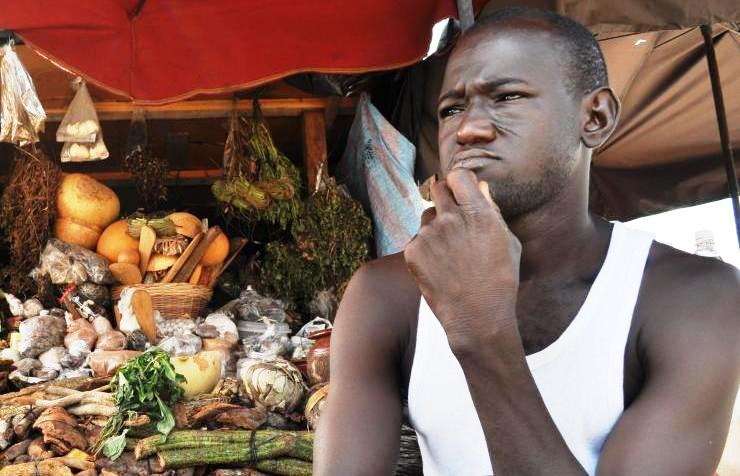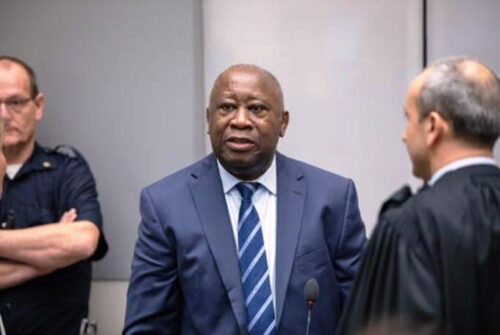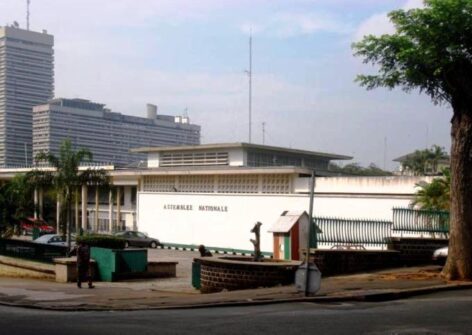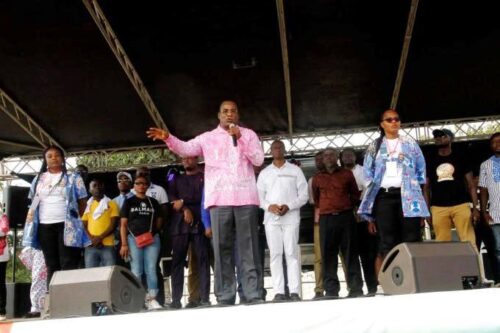Open wounds.

The wounds caused by the two civil wars are still open since they have not yet been healed.
The politicians, the soldiers and the militias that committed crimes against the population for the most part have not been put on trial. And there has not been a sort of Truth and Reconciliation Commission, like the one created in South Africa after the fall of the Apartheid regime, to investigate the abuses, to offer reparation to the victim and to reconcile the different fronts. For a long time, it seemed that only Gbagbo and his supporters were going to pay the price for violence and abuse during the conflicts, and they spoke of a “justice of the winners”. In terms of public image, Ouattara succeeded in distancing himself from the warlords that helped him to become president.

Laurent Gbagbo at the International Criminal Court (Photo: ICC)
The case of Gbagbo is both exemplary and controversial. In 2011, he was brought before the International Criminal Court (ICC) due to the crimes committed during the civil wars. But on 31 March 2021 after two different rulings of the Court he and Charles Ble Goude, who was Minister for the Youth under Gbagbo and was considered the chief of pro-Gbagbo militias, were acquitted of the charges. On 17 June 2021 Gbagbo came back to Cote d’Ivoire. On 6 August 2022 Ouattara pardoned Gbagbo of a 20-year prison sentence for a robbery during the crisis.The Ivorian government was apparently taken aback by the acquittal before the ICC, such as part of the international community. But why did they grant him a grace that creates problems on a political level? Maybe they decided to guarantee peace by defusing the tensions and gaining the support of the pro-Gbagbo militants. But if the former president and his partner were not sentenced by the ICC, who committed those crimes? And why? Will the victims receive compensation?
It is true that some political leaders (such as Ble Goude) admitted at least in part their responsibilities. But it was something on a small scale, not organic, with no apparent effect on politics and society. What happened during the conflict left bitter memories of discrimination and persecution by the ethnic groups against each other. The coexistence between the different ethnicities is at risk because every group may think that those who surround it could try to eliminate it at any time. Konan Bédié, who invented the ideology of Ivoirité, on some occasions again took positions that were considered racist.
The Elite
At present, Ouattara is 81 years old, Konan Bédié is 88 and Gbabgo is 77. In 2020 almost 60% of the Ivorians were under 25. In 2023 only 2.95% of the population is over 64. That is to say in Cote d’Ivoire there is a small elite of aged leaders that are responsible for a long phase of turmoil and keep on ruling a much younger population.
In more recent years, some younger politicians seemed to emerge, but for different reasons, they never succeeded in reaching the level of power of the three leaders.
As seen before, Guillaume Soro (who is 50) was basically stopped by Ouattara and his supporter during his rise to power. Another ascending leader was Hamed Bakayoko. A loyal Ouattara supporter during the years, he had strong links with the president’s entourage, but also the ability to reach out to competitors and enemies. He served as Minister of Interior and Minister of Defence under Ouattara, before becoming Prime Minister in July 2020 after the death of Ahmadou Gon Coulibaly.

The National Assembly is the lower house of the Parliament of Ivory Coast since November 2016.
According to some sources, Ouattara thought Bakayoko could become his successor, before changing his mind and deciding to run again in 2020. Bakayoko died of cancer at 56 in March 2021. Charles Ble Goude (who is 51) remains a controversial politician that has the ability to mobilize the masses, even after his stint in prison during the trial before ICC. But he cannot run for office due to a criminal conviction.
Therefore, there is no apparent heir to the three leaders. But Konan Bédié and Gbagbo must face internal opposition within their factions. Konan Bédié is the leader of Parti Démocratique de la Cote d’Ivoire – Rassemblement Démocratique Africain (PDCI-RDA), the party founded by Houphouet-Boigny. Within the PDCI-RDA there is growing opposition to his leadership especially from younger members. The opponents ask for a renewal of the party and of its leadership. Until now Konan Bédié succeeded in stifling the internal resistance and remains firmly in control. Some dissidents already left the party, but this issue could recur in future for PDCI-RDA. Jean-Louis Billon, a senior leader of the party, has announced he will run for president in 2025 while Konan Bédié did not yet clarify his intentions.

Pascal Affi N’Guessan is the leaders of the Parti des Peuples Africains – Cote d’Ivoire (PPA-CI). (Photo: Twitter)
Other candidates could emerge creating divisions within PDCI-RDA. Gbagbo must cope with a more complex situation. The party he co-founded, the Front Populaire Ivoirien (FPI), when he was in jail split between his hard-line supporters, who refused to take part to the political process, and the faction headed by the actual leader, Pascal Affi N’Guessan, who decide to participate in elections. After he came back in Cote d’Ivoire Gbagbo was therefore forced to create a new party and on 17 October 2021 the Parti des Peuples Africains – Cote d’Ivoire (PPA-CI) was created. Gbagbo remains one of the major players on the Ivorian political scene, but his former political base is divided, and he has to compete both with Affi N’Guessan and his former wife Simone Gbagbo in front of the same audience. And there is Ble Goude that was his staunch supporter but then the two took different paths. These rifts end up favouring Ouattara, who has not yet nominated an heir. (Open Photos: 123rf)
(A.C.)



